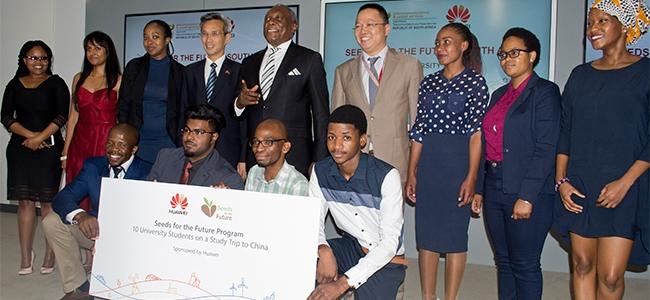
Ten outstanding university students have been selected to receive ICT training in China as part of Huawei's Seeds for the Future training programme. This is the second group of students to participate in the company's global training initiative.
Last year, Huawei, in partnership with the Department of Telecommunications and Postal Services (DTPS), sent 10 students from universities across SA for international training in Beijing and Shenzhen.
The training exercise is a partnership initiative between Huawei and DTPS to cultivate ICT talent. The department and the Chinese ICT company have targeted to train 1 000 youth in ICT skills over the next five years.
The primary objective of the training is to cultivate ICT talent, promote knowledge transfer to build the telecoms industry and broaden digital access.
This year's intake also hails from universities across the country. The participants are studying various subjects in the ICT sector and were selected from over 500 entrants that applied for the training programme.
Over a two-week period, the students will receive training in technologies such as 5G, LTE and cloud computing at Huawei labs located in Beijing as well as the company's headquarters in Shenzhen.
Speaking at yesterday's send-off event in Sandton, DTPS minister Siyabonga Cwele expressed his excitement about the training programme.
Such a programme exposes young talent to new skills and improves their chances of being employed, he said.
"The Seeds for the Future programme has a huge impact in our society. The e-skills which we are pushing at this level focus on ensuring we are not left behind as we enter a new competitive world of a digital economy.
"In the future, everything is going to be digital...We are in another revolution, which is the fourth industrial revolution, and we have to prepare by up-skilling our workforce and re-skilling them."
Cwele pointed out that Huawei is the perfect example for students to learn from in terms of how a business can develop from a small company to being a global player.
In the last couple of years, Huawei has come out at the top because of focused leadership, hard work and innovation, he stated. "If they didn't innovate they were going to become a dinosaur. If companies don't innovate in this era of a digital economy, they will die."
The minister noted the department had received positive feedback from the first group of students that went on the study exchange programme to China. The students said it was useful for their own development and most of them are now contributing to the growth of the economy, stated Cwele.
According to Huawei, a number of the students selected last year have come back and are furthering their studies. Some of the students have secured employment in the ICT sector, it says.
"I'd like to encourage all the students to utilise this opportunity to the maximum because education is quite crucial for us to meet our objective of being globally competitive. If we are not pushing on that side, other countries are going to be ahead of us," Cwele concluded.
Share